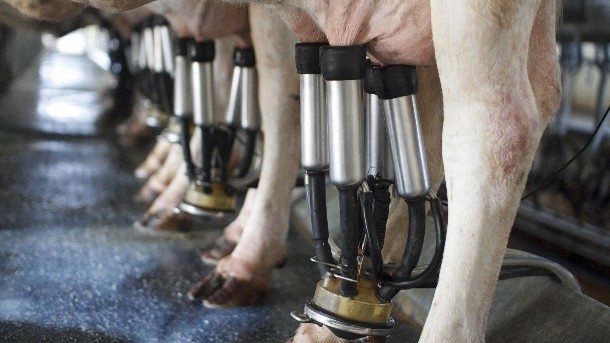Study finds drugs in milking parlor water samples

A total of 12 drugs were measured.
The authors also observed that 29% of the samples tested contained more than one pharmaceutical.
To date, the effects of the continuous consumption of these mixtures of drugs in water or milk are unknown; however, antimicrobials may affect the human gut microbiota or have toxic effects on sensitive consumers, such as infants, the elderly, and allergic individuals who frequently consume milk.
They also note that continuous consumption of low levels of these antimicrobials can lead to the development of bacteria with resistance genes in consumers, which may result in synergistic or antagonistic effects.
The study, done at the Department of Analytical Chemistry, Nutrition and Bromatology, Faculty of Veterinary Medicine, Universidade de Santiago de Compostela, in Lugo, Spain, is published in the Journal of Dairy Science.
Substances reach aquatic environment
The authors said the use of antibiotics in animal production is a common practice and, once consumed, pharmaceuticals are metabolized and part of the initial dose is excreted unchanged, with the higher percent excreted in the form of metabolites; both the parent compound and metabolites are excreted via feces and urine in humans and animals.
Such substances can reach the aquatic environment through wastewater treatment plants because the plants are not able to remove them completely, the researchers said.
The compounds can also be introduced through the use of contaminated manure in agricultural soils as fertilizer, leading to potential contamination of rivers, lakes, and drinking water sources.
The researchers add that even if small amounts of water carrying pharmaceuticals remain in milk tanks after cleaning, the new fresh milk would also be contaminated with these pharmaceuticals.
Contamination sources
They add that while maximum residue limits of pharmaceuticals allowed in foods of animal origin within the EU are provided in Regulation 37/2010 (EU, 2004), pharmaceuticals are not usually controlled in the water used for cleaning facilities, although legislation states that cleaning water used on farms should be of the same quality as human drinking water.
Out of the 19 pharmaceuticals analyzed, 12 were detected in water used for cleaning milking parlors, which should be of potable water quality.
These pharmaceuticals belong to three of the most widely used therapeutic groups: antimicrobials, coccidiostats, and corticosteroids.
Pharmaceuticals found in water used for cleaning milk parlors:
Betamethasone
Decoquinate
Enrofloxacin
Monensin
Salinomycin
Sulfachloropyridazine
Sulfadiazine
Sulfamethazine
Sulfamethoxypyridazine
Sulfapyridine
Sulfaquinoxaline
Trimethoprim
Antimicrobials were the most frequently detected group, with sulfonamides and quinolones measured in 57% of the samples.
Effects on humans unknown
The researchers said 29% of the samples contained more than one pharmaceutical: six samples were positive for two drugs, four samples for three drugs, three samples included four drugs, one sample contained five drugs, and one sample was positive for six drugs.
The researchers said that contamination of the samples investigated may be caused by contamination of the water source, such as rivers, lakes, and water wells via the discharge of incompletely clean final effluent from wastewater treatment plants, or due to the application of manure over culture lands as fertilizer.
Microbiological analyses demonstrated that the water used in most cases is drinkable and suitable for human consumption; however, there is evidence of fecal contamination, because 26% of the samples were positive for total coliforms, the study noted.
The authors concluded the results confirm pharmaceuticals can penetrate the human food supply via milking parlors, but the effects of continuous consumption of these mixtures of drugs are unknown.
They said that as no regulations exist for the presence of pharmaceuticals in drinking water, the long-term effects of low-dose pharmaceuticals need to be investigated.
Source: Journal of Dairy Science
Identification and quantification of 12 pharmaceuticals in water collected from milking parlors: Food safety implications
Authors: María Veiga-Gómez, Carolina Nebot, Carlos Manuel Franco, Jose Manuel Miranda, Beatriz Vázquez, Alberto Cepeda








